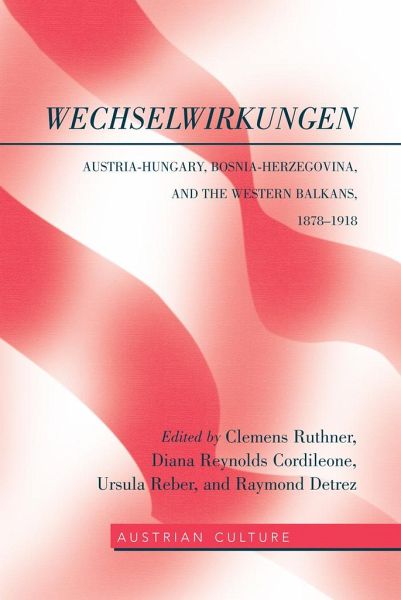
WechselWirkungen
Austria-Hungary, Bosnia-Herzegovina, and the Western Balkans, 1878-1918
Herausgegeben: Lamb-Faffelberger, Margarete; Ruthner, Clemens; Reynolds Cordileone, Diana; Reber, Ursula; Detrez, Raymond
Versandkostenfrei!
Versandfertig in 6-10 Tagen
114,80 €
inkl. MwSt.
Weitere Ausgaben:

PAYBACK Punkte
0 °P sammeln!
What can post/colonial studies and their approaches contribute to our understanding of the Austro-Hungarian (k.u.k.) occupation and administration of Bosnia-Herzegovina from 1878 to 1914? This anthology presents some possible answers to this research question which goes back to a workshop held at the University of Antwerp in 2005. Later more researchers were invited from the small international circle of established and emerging experts to contribute to this new perspective on the imperial intermezzo of Bosnia-Herzegovina (which is usually overshadowed by the two World Wars and the Yugoslav S...
What can post/colonial studies and their approaches contribute to our understanding of the Austro-Hungarian (k.u.k.) occupation and administration of Bosnia-Herzegovina from 1878 to 1914?
This anthology presents some possible answers to this research question which goes back to a workshop held at the University of Antwerp in 2005. Later more researchers were invited from the small international circle of established and emerging experts to contribute to this new perspective on the imperial intermezzo of Bosnia-Herzegovina (which is usually overshadowed by the two World Wars and the Yugoslav Succession Wars of the 1990s). Alternative readings of both Austrian and Bosnian history, literature, and culture are meant to serve as a third way, as it were, bypassing the discursive fallacies of Habsburg nostalgia and nationalist self-victimization.
As a result, the essays of this interdisciplinary volume (collected and available in print for the first time) focus on the impact the Austro-Hungarian presence has had on Bosnia-Herzegovina and vice versa. They consider both the contemporary imperialist setting as well as the expansionist desire of the Habsburg Monarchy directed southward. Exploring the double meaning of the German title WechselWirkungen, the authors consider the consequences of occupation, colonization and annexation as a paradigm shift affecting both sides: not only intervention and interaction at a political, economic, social, cultural, and religious level, but also imposed hegemony along with cultural transfer and hybridity. Finally, the imperial gaze at the Balkan region outside of the Habsburg territories is included in the form of three exemplary case studies on Albania and Montenegro.
This anthology presents some possible answers to this research question which goes back to a workshop held at the University of Antwerp in 2005. Later more researchers were invited from the small international circle of established and emerging experts to contribute to this new perspective on the imperial intermezzo of Bosnia-Herzegovina (which is usually overshadowed by the two World Wars and the Yugoslav Succession Wars of the 1990s). Alternative readings of both Austrian and Bosnian history, literature, and culture are meant to serve as a third way, as it were, bypassing the discursive fallacies of Habsburg nostalgia and nationalist self-victimization.
As a result, the essays of this interdisciplinary volume (collected and available in print for the first time) focus on the impact the Austro-Hungarian presence has had on Bosnia-Herzegovina and vice versa. They consider both the contemporary imperialist setting as well as the expansionist desire of the Habsburg Monarchy directed southward. Exploring the double meaning of the German title WechselWirkungen, the authors consider the consequences of occupation, colonization and annexation as a paradigm shift affecting both sides: not only intervention and interaction at a political, economic, social, cultural, and religious level, but also imposed hegemony along with cultural transfer and hybridity. Finally, the imperial gaze at the Balkan region outside of the Habsburg territories is included in the form of three exemplary case studies on Albania and Montenegro.














